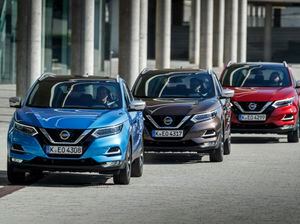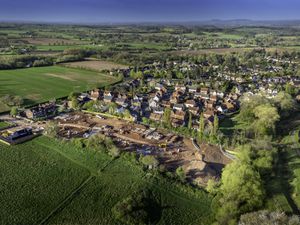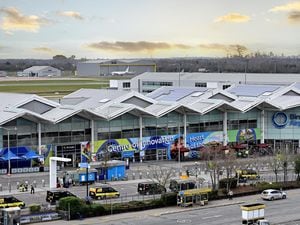Predicted car sales in UK drop by nine per cent amid Ukraine war
The UK car industry has downgraded its forecast for the number of cars it expects to sell this year by almost a tenth, or 170,000 vehicles.

Around 1.72 million new cars will be registered in 2022, according to the Society of Motor Manufacturers and Traders.
This is down nine per cent from the forecast of 1.89 million issued in January.
The reduction comes as the number of new cars registered in April fell by 16 per cent year-on-year.
Some 119,167 new cars were registered last month, down from 141,583 in April 2021.
This is despite lockdown restrictions meaning showrooms were closed for the first 11 days of April last year.
Jaguar Land Rover, which has its engine manufacturing centre at Wolverhampton, saw sales fall but MG, which is based at Longbridge, continued to see growth in sales of its vehicles that are made overseas by 26.4 per cent to 2,714.
Jaguar sales were down 43.8 per cent to 1,119 with Land Rover falling 29 per cent to 4,523.
Top selling brand was Ford with 10,060 cars registered (8.4 per cent of the total market) but down 22.3 per cent.
Top selling car for the month at 3,804 was the Nissan Qashqai.
SMMT chief executive Mike Hawes said: "The worldwide semiconductor shortage continues to drag down the market, with global geopolitical issues threatening to undermine both supply and demand in the coming months.
"Manufacturers are doing everything they can to deliver the latest low and zero emission vehicles, and those considering purchase should look to place their orders now to benefit from incentives, low interest rates and reduced running costs.
"Accelerating the transformation of the new car market and the carbon savings demanded of road transport in such difficult times requires not just the resolution of supply issues, however, but a broader package of measures that encourages customer demand and addresses obstacles, the biggest of which remains charging anxiety."
Jim Holder, editorial director of magazine and website What Car?, said the latest monthly figures show the automotive industry is "in an increasingly precarious position".
It has invested billions of pounds in developing new vehicles – including a raft of electrified models – but output is being "strangled by world events" such as a semiconductor shortage and the war in Ukraine, he explained.
He went on: "While profitability is high, the industry cannot expect to thrive in such a challenged market indefinitely - and likewise consumers cannot carry the burden of paying rising prices unchecked, especially as the cost of living elsewhere puts a focus on non-essential spending."
Registrations of pure electric cars bucked the overall trend last month, with a 41 per cent year-on-year increase.
The SMMT anticipates that plug-in cars such as pure electrics and plug-in hybrids will account for more than a quarter of the new car market by the end of 2022.
Alex Buttle, co-founder of used car marketplace Motorway.co.uk, said: "While new car sales overall continue to disappoint, once again it's electric vehicles that are providing the silver lining to the dark cloud that is hanging over the new car industry."
Ben Nelmes, co-founder and head of policy at green motoring consultancy New AutoMotive, said the "steady growth" in electric cars is welcome but the Government needs to "go faster" to encourage more people to make the switch from petrol and diesel cars.
The Government is planning to adopt a zero emission vehicle mandate, which will require manufacturers to sell a certain percentage of those cars and vans from 2024.
Mr Nelmes called on ministers to introduce this at an "ambitious California-style" level.
The US state has been implementing a ZEV mandate since 1990, with the percentage reaching 22 per cent in 2025.
Sue Robinson, chief executive of the National Franchised Dealers Association, said: "New car sales continued to fall in April, largely driven by supply side constraints, as a result of continued lockdowns in China, impacting the availability of new vehicles."
James Fairclough, chief executive of AA Cars, said: “After a painfully slow start to the year, things are getting worse for new car sales. April’s fall follows the worst March sales figures for nearly two and half decades, and the outlook remains mixed at best – thanks to the low numbers of new cars arriving in showrooms.
“Dealers find it hard to sell cars they don’t yet have, and while determined buyers can place orders, many are being put off by wait times of weeks or even months.
John Wilmot, chief executive of car leasing comparison website LeaseLoco, added: “New car sales are being hampered by a number of factors. Vehicle availability has been a problem for a while, with supply chain issues and the ongoing microchip shortgage still unresolved.
"Now, rising inflation has been thrown into the mix. Families are struggling with rising living costs, and that is likely to make them more cautious about purchasing large ticket items like a new car, even if the desire to buy is there.
“Strong EV and plug-in registrations are the one positive amongst the gloom and show clearly where the road to recovery lies."





